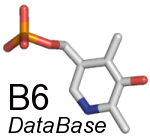|
|
| type |
Journal Article |
| authors |
Mockel, B.; Eggeling, L.; Sahm, H. |
| title |
Functional and structural analyses of threonine dehydratase from Corynebacterium glutamicum |
| journal |
J Bacteriol |
| Activity |
4.3.1.19 |
| Family |
4.3.1.19 |
| sel |
selected |
| ui |
1459955 |
| year |
(1992) |
| volume |
174 |
| number |
24 |
| pages |
8065-72 |
| | |
|---|
| abstract |
Threonine dehydratase activity is an important element in the flux control of isoleucine biosynthesis. The enzyme of Corynebacterium glutamicum demonstrates a marked sigmoidal dependence of initial velocity on the threonine concentration, a dependence that is consistent with substrate-promoted conversion of the enzyme from a low-activity to a high-activity conformation. In the presence of the negative allosteric effector isoleucine, the K0.5 increased from 21 to 78 mM and the cooperativity, as expressed by the Hill coefficient increased from 2.4 to 3.7. Valine promoted opposite effects: the K0.5 was reduced to 12 mM, and the enzyme exhibited almost no cooperativity. Sequence determination of the C. glutamicum gene for this enzyme revealed an open reading frame coding for a polypeptide of 436 amino acids. From this information and the molecular weight determination of the native enzyme, it follows that the dehydratase is a tetramer with a total mass of 186,396 daltons. Comparison of the deduced polypeptide sequence with the sequences of known threonine dehydratases revealed surprising differences from the C. glutamicum enzyme in the carboxy-terminal portion. This portion is greatly reduced in size, and a large gap of 95 amino acids must be introduced to achieve homology. Therefore, the C. glutamicum enzyme must be considered a small variant of threonine dehydratase that is typically controlled by isoleucine and valine but has an altered structure reflecting a topological difference in the portion of the protein most likely to be important for allosteric regulation. |
| last changed |
2009/06/29 13:11 |
|











